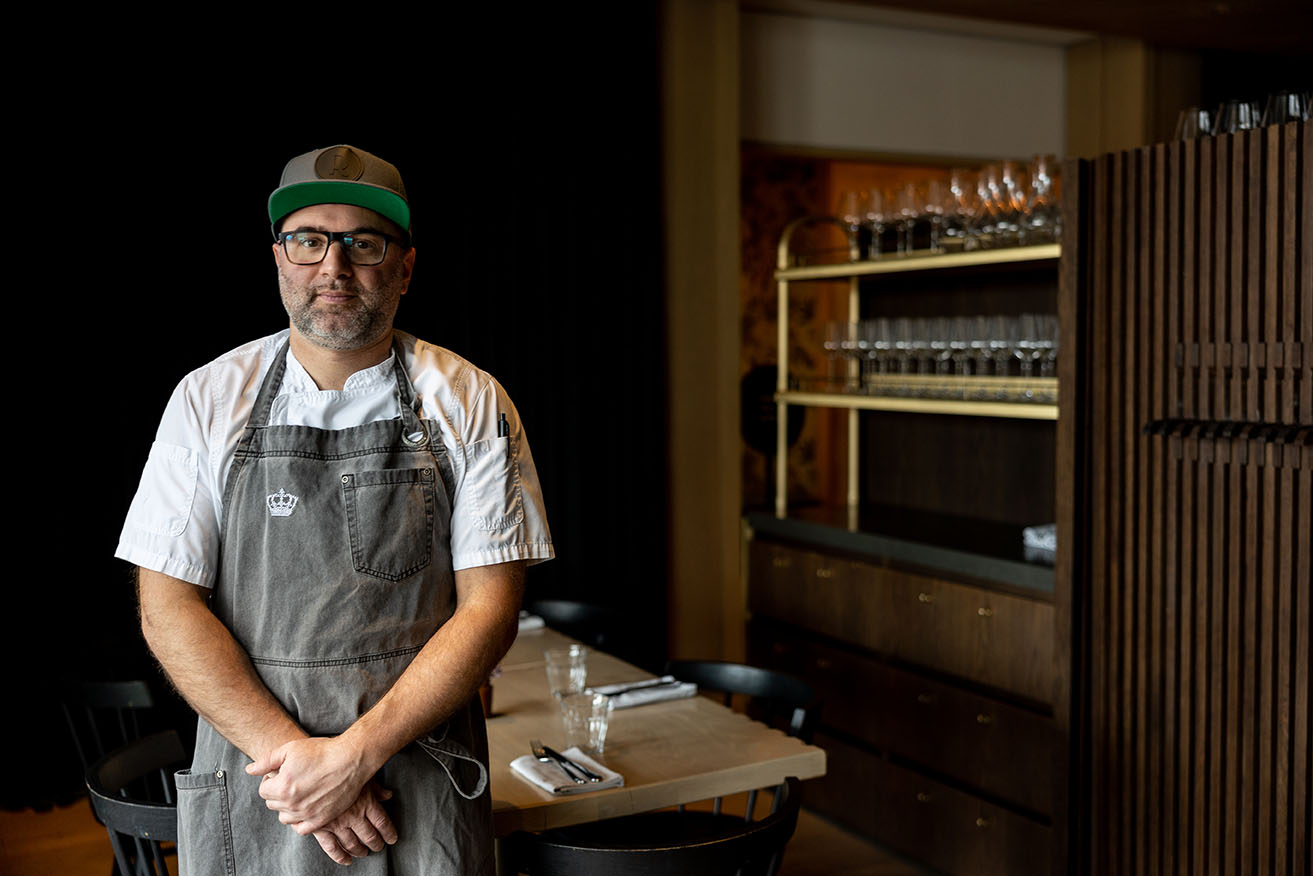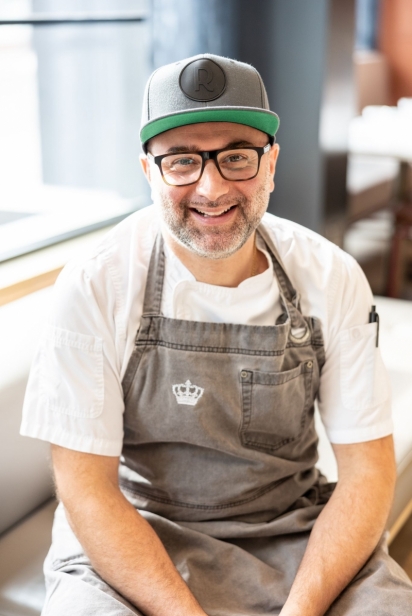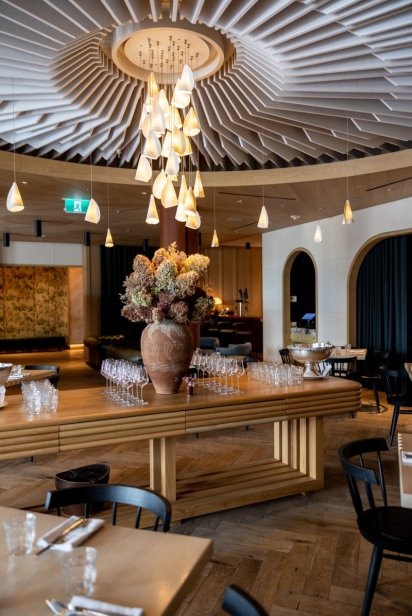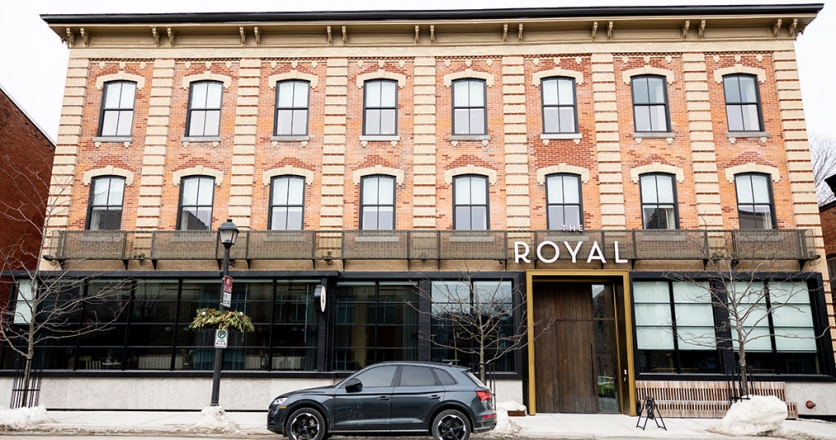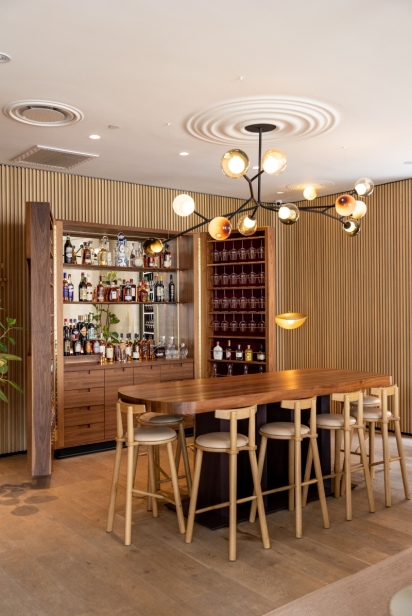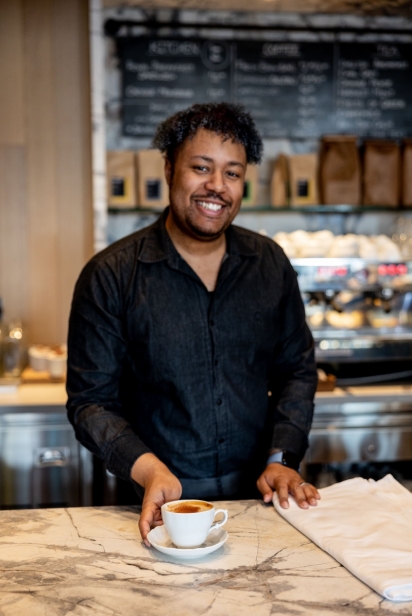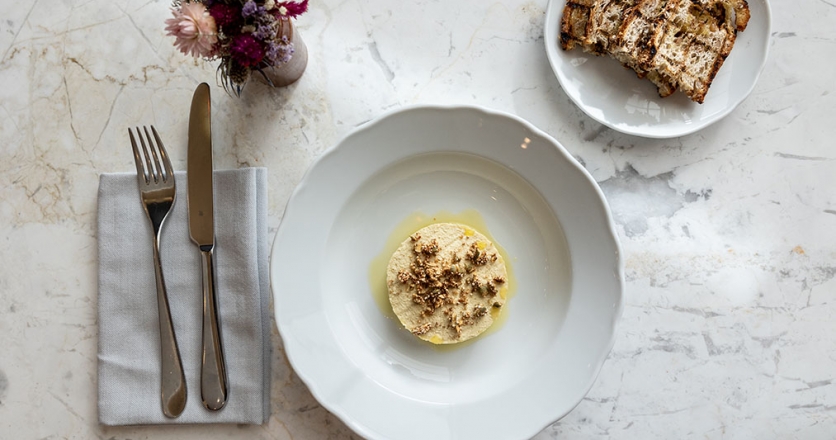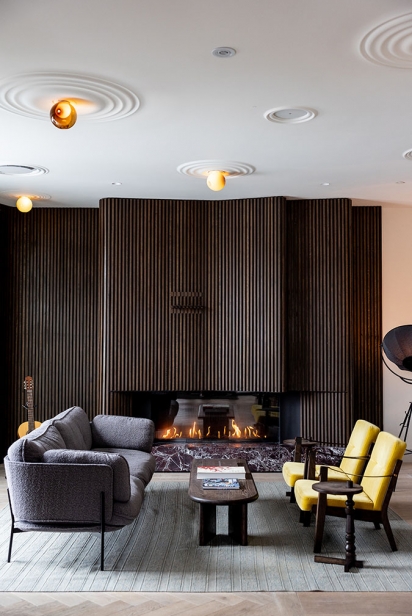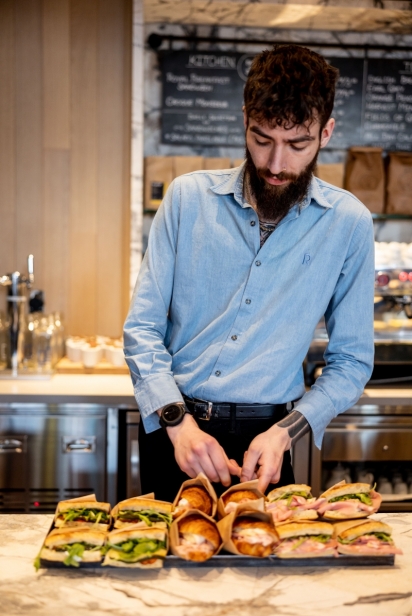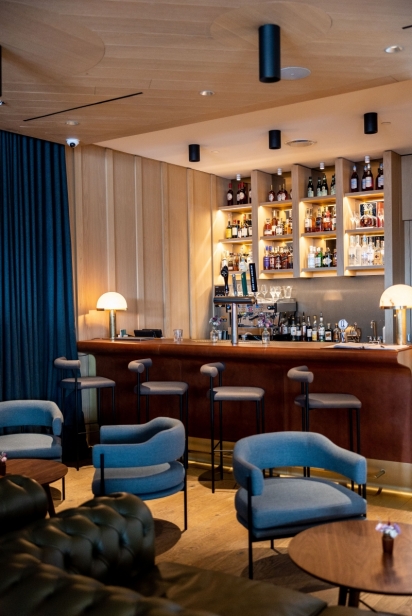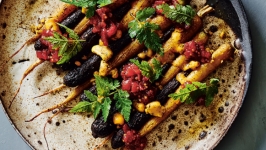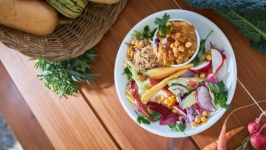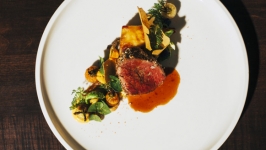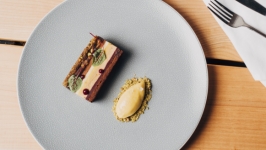Restoring the Royal
It doesn’t get much more local than the dish Chef Albert Ponzo presents to edible Ottawa when asked to make something that represents himself or his restaurant on a plate. The smoked white-fish mousse is elegant in its disc-shaped form, served in a soup plate. It is topped with “grainola” and drizzled with fine olive oil. The main ingredient is Ontario white fish, which comes from lakes surrounding The Royal Hotel in Prince Edward County, where Ponzo serves as executive chef.
Ponzo fillets, brines and smokes the white fish (its actual name) on site and then makes it into a traditional French mousse with cream, eggs, shallots and alcohol of some kind, often white wine. The garnish is a play on granola and features different grains and seeds, including house-puffed amaranth, roasted quinoa, oats and pumpkin seeds.
“We try to source everything locally as much as possible,” Ponzo says. “We’ll use either local providers here or a company called 100km Foods.”
The best of the county
The owners of The Royal Hotel own Edwin County Farms, a 700-acre farm that supplies the restaurant with much of its produce, even in the winter. The farm also raises beef, so that’s an option for Ponzo as he writes his menus. A farm-based sugar bush offers local maple syrup, too.
“That was the big inspiration for me to join this project — the fact that there was a farm supplier with the hotel,” he says.
In addition to vegetables and beef, the farm has raised eight pigs. Ponzo uses the pork in all kinds of menu items, including charcuterie, an art he studied under Austrians Christoph and Isabell Wiesner, who have since become colleagues. Together the three have given workshops in Toronto and Michigan. The Wiesners practise in “seam butchery,” a process that cuts an animal’s muscles along its seams, preserving all possible meat. It’s unquestionably nose-to-tail.
For fish, onzo uses Bay Williams Fisheries.
“It’s some of the best fish I’ve ever seen come out of these waters,” the chef says. “I don’t know what it is, but it’s sweeter — it’s just delicious. You barely have to do anything to it.”
The restaurant also makes good use of Prince Edward County wines and locally brewed beer.
A Royal restoration
When he joined the team at the Royal, Ponzo, who has worked in several high-end restaurants in Toronto, had already decided he wanted to get out of the city and was keen to relocate his family to Prince Edward County. One of his friends was on the design team for the hotel, and Ponzo asked for an introduction to Greg Sorbara, former provincial Liberal finance minister and the owner of the hotel. He then met Sol Korngold, Sorbara’s son-in-law and the hotel’s general manager, and they hit it off. Soon, he was hired as the executive chef.
The hotel has a storied past. It’s been in Picton since 1879 and served as a community hub for much of that time. At the turn of the 20th century, however, the hotel was in a state of disrepair and the owners shut the doors. It sat empty for 14 years Sorbara bought it as a project his whole family could take on. All of his children were interested in heritage, after all. After a nine-year restoration and renovation effort — some have likened it to a rebuild — it opened its doors in May 2022.
The hotel has a large dining room at the back of the main floor and a more casual dining area filled with natural light at the front of the building. The idea behind the large windows at the front is to make the hotel a welcoming place. This front dining area includes a horseshoe bar for those who prefer that kind of seating. Connected to it is the grab-and go counter, which offers freshly made pastries and coffee.
“The menus are the same at both the front and the back,” Ponzo says. “And we have a beautiful garden with a terrace in the summer. The garden menu is more typically snacks and drinks.”
He has a talented brigade in the kitchen, which produces breakfast, lunch and dinner. He lauds his pastry chef, Sarah Villamere, who previously worked at Langdon Hall and the Fogo Island Inn.
All that jazz
Ponzo’s career began with studies in jazz performance at Humber College straight out of high school.
“I loved it, and I graduated with honours,” he says. “I was playing around Toronto and getting into Latin American salsa music and funk. But I was finding it hard to make ends meet, so I started serving tea and then [I fell] in love with being in restaurants.”
That’s when the U-turn occurred. He soon had a notion that he might someday open his own restaurant, so his manager at the time suggested he take some work in a kitchen to get an idea of how the back of house works. He did and then decided to apply for culinary school. That’s when chef Didier Leroy, who trained and worked at several Michelin-star restaurants in Paris for 18 years before moving to Toronto, suggested he change that plan. One of only a few Master Chefs in Canada and just 450 worldwide, Leroy told Ponzo he should consider skipping formal study and just work in a good restaurant, even if he did it for free.
“So I started working at a Crush Wine Bar — [Leroy’s] old sous-chef was the chef there,” he recalls. “I loved it, and after six weeks, I was offe ed a job there. I never looked back and just worked my way through the ranks.”
After a few years, he took a professional development course on pastries and baking to acquire knowledge in that mysterious part of the kitchen. Otherwise, his study was strictly on-the-job. Ironically, he taught at Loyalist College in recent years, including during the pandemic. “So I came kind of full circle.”
Learning through travel
When SARS hit Toronto, Ponzo decided to leave Crush Wine Bar and head to Europe.
“I worked a little bit in Italy [and then went] to France and Spain, just to eat and learn about food,” he says. “I went for a few months. When I came back, I started working at various restaurants; one in Yorkville was a French restaurant and then I ended up at a Thai restaurant. I helped develop their pastry program — that’s when I took that pastry course.”
He then went to work at Michael Bonacini’s legendary restaurant Canoe before returning to Crush. After that, he was hired at Le Sélect Bistro, a Toronto staple when it comes to classic French dining. He was hired to train the executive sous chef, but when the head chef left, he was offered the top job.
“I was 29 at the time, and it was an extremely busy restaurant,” he says.
From the time he started in kitchens to his stint at Le Sélect, it was a fast trajectory to the head of the kitchen. “I was obsessed,” he admits.
“Everything I did revolved around eating, drinking, cooking, learning and pushing myself — full force.
The Ponzo Family Farm
Besides the luxury of getting freshly grown vegetables for his professional kitchens, Ponzo also enjoys that option at home.
“Essentially, we just have our own vegetables for the family,” he says. “Tomatoes, a lot of asparagus, raspberries.”
At first, he and his wife raised meat birds, such as chickens, they were selling at the farm gate, but when The Royal opened, they had to stop that time-consuming pursuit. However, they still raise hens who lay eggs and sell them through egg subscriptions at the farm gate. Ponzo himself is also a hobby beekeeper and produces honey from the farm.
Enjoying these Ponzo-produced yields are the chef, his wife Marlise and their three children — 13- and 11-year-old boys and an eight-year-old girl.
Influences and inspiration
Ponzo’s family history — his roots are Italian and his Nonna was his first culinany mentor — plays broadly into his repertoire.
Other influences include Frederic Geisweiller, the owner of Le Sélect Bistro, who taught him business and how to manage the kitchen and front of house. Though Ponzo never worked directly for him, sustainability and eat-local guru Jamie Kennedy is also an influence.
“I still consider him a mentor,” Ponzo says. “I did a lot of events where we were both featured.”
When he’s putting together a menu, Ponzo starts by thinking about what’s available and seasonal.
“So usually, you have to kind of work backwards,” he says. “I like working like that — asking what I have and then working from that because I feel like it has a more natural flow to it.”
The Royal Hotel
247 Main St, Picton, Ont.
theroyalhotel.ca | 613.961.2600 | @theroyalhotelpicton


